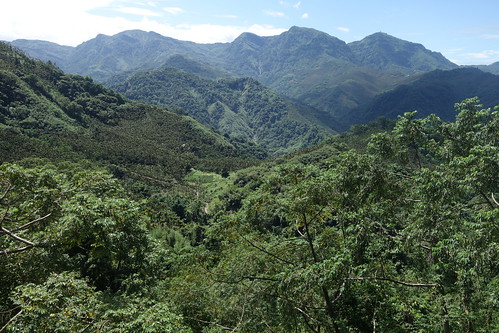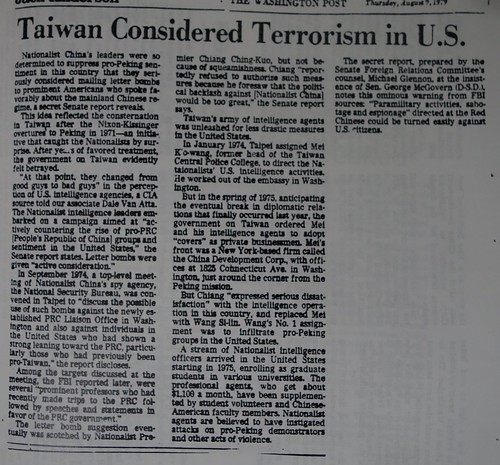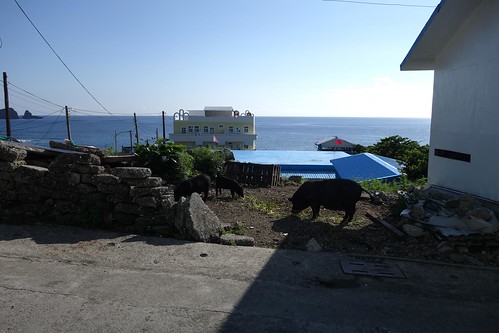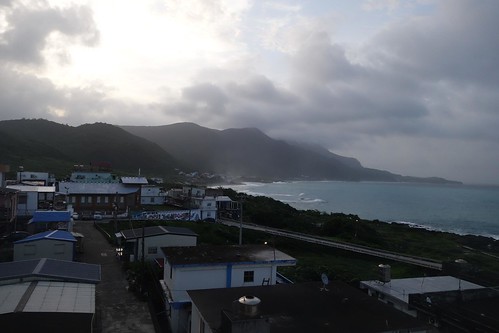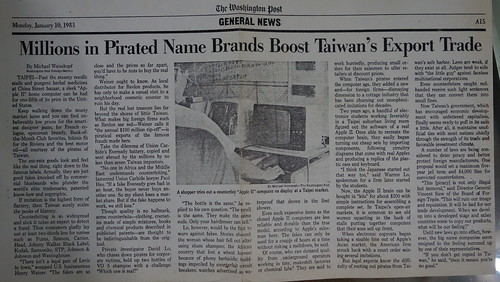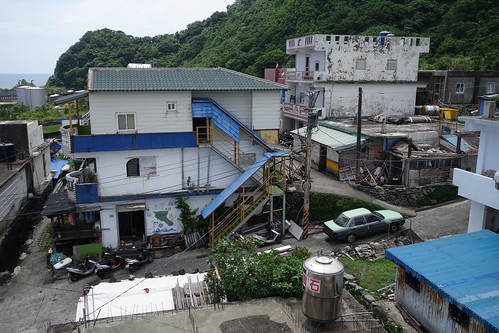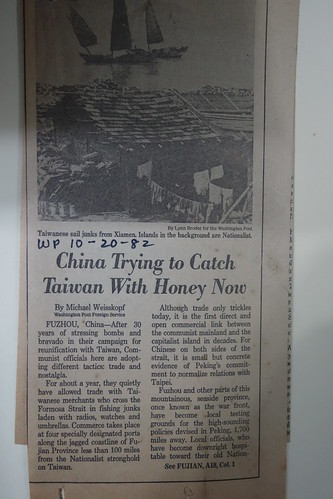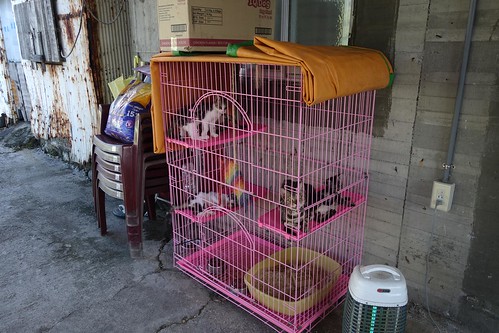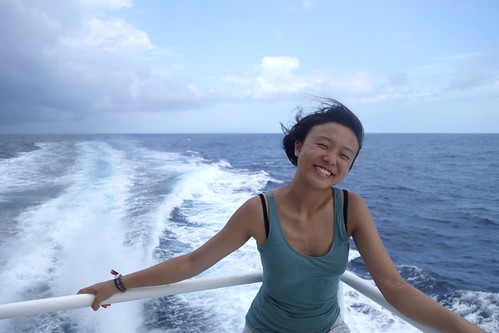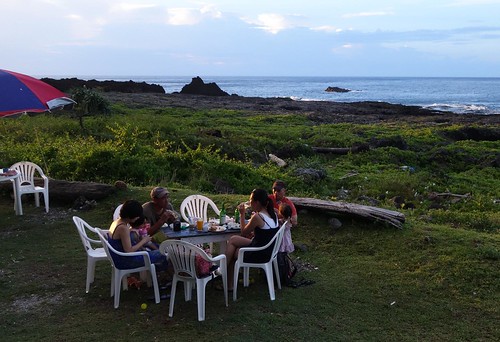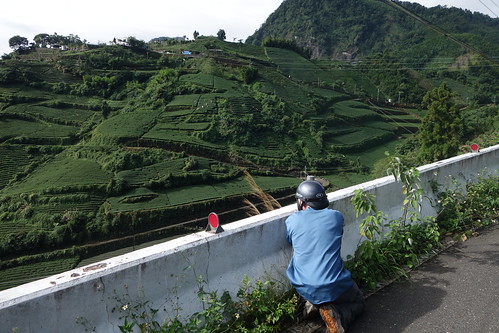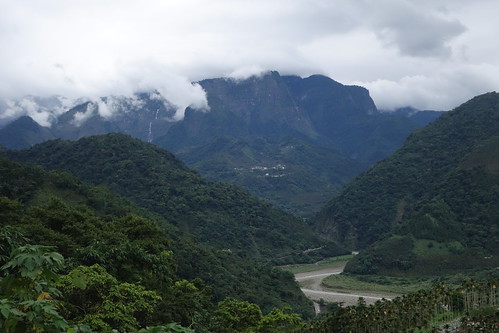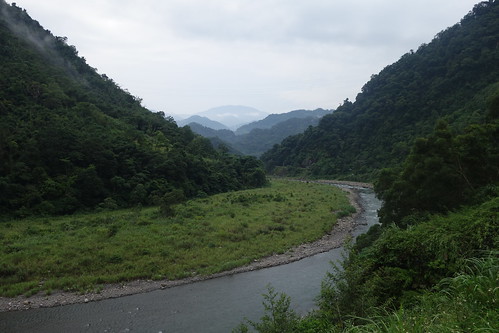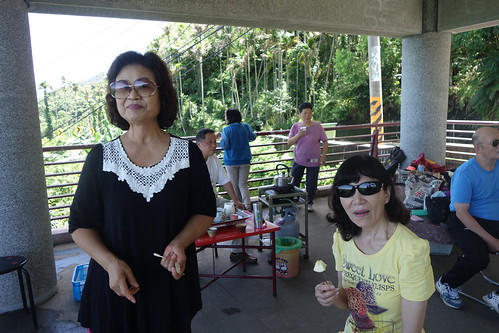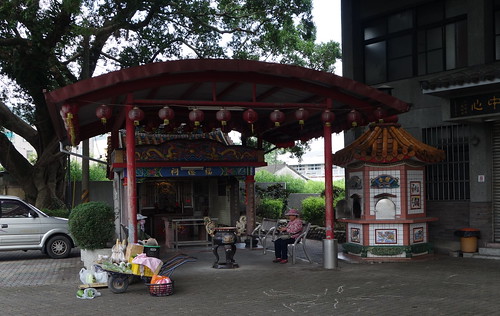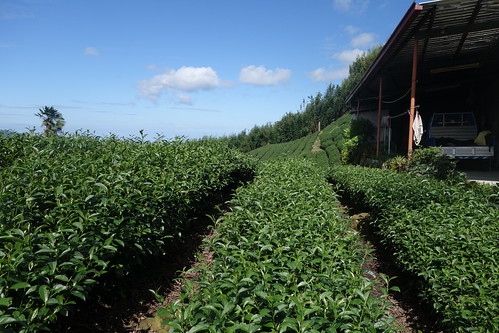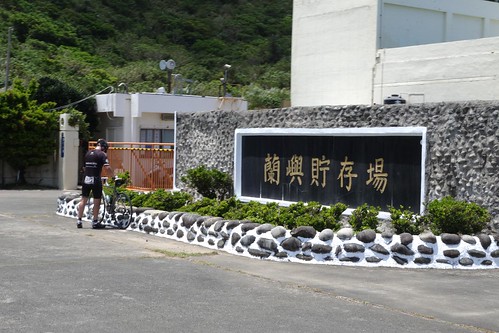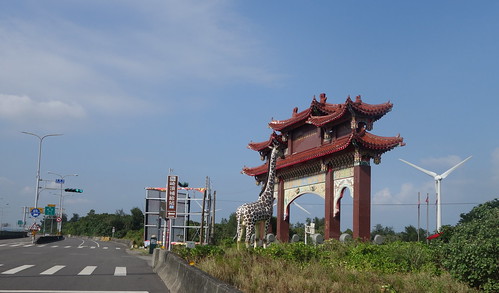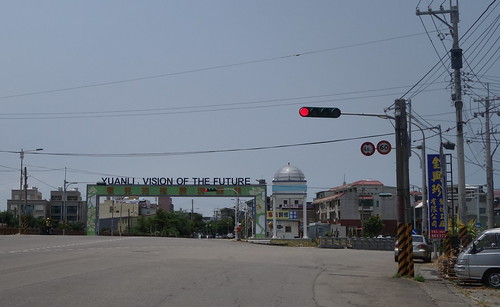We were heartbroken to lose our beautiful lab/retriever mix to kidney failure a couple of months ago. Then yesterday I was in the street in front of our house parking my scooter when this dog, a neighbor's, ran over to say hello. He is super friendly, and of course I greeted him. I remarked to our neighbor on how gorgeous he was and joked that I wished he were mine. My neighbor laughed and said I could have him, because he was her daughter's and neither mom nor daughter wanted him. Next thing I knew, we'd adopted him. So wonderful!
First, the good news. AP has made a quantum leap in quality
in The Formula:
China claims Taiwan is its own territory, to be brought under its control by force if necessary. Tsai's election upended Beijing's strategy of using economic inducements to convince Taiwanese that political unification is not only inevitable but also in their best interests.
Tsai's Democratic Progressive Party holds a strong legislative majority and favors Taiwan's formal independence from China, although she has taken no steps toward that goal.
Despite that, her refusal to endorse the concept of a single Chinese nation prompted Beijing to suspend the liaison contacts days after her inauguration, in an attempt to ratchet up pressure on her.
Although China says Taiwan has been part of its territory since ancient times, the two sides have only been unified for four of the past 120 years, splitting most recently amid the Chinese civil war in 1949. Taiwan does not acknowledge Beijing's claim of authority over it, while surveys show an overwhelming majority of Taiwanese favor maintaining their current state of de-facto independence.
Depending on what you mean by "unified" AP is wrong to say for those four years Taiwan was "unified" -- the ROC occupied it on behalf of the wartime Allies and it was not (and is not) part of China. But note the care that AP takes to present the Taiwan side in this, and also to correctly define the 1992 Consensus (not even mentioned!!!) as what it is: the demand that Tsai say Taiwan is part of China. This is a thing lovely to see. Mega kudos and beers on me, if I ever meet this writer.
Aside: My observant friend pointed out to me another fascinating aspect of Tsai's apology to the aborigines: her apology re-orients all groups on the state as a neutral arbitrator with all citizens having a state-based citizenship, rather than the KMT vision of a ethnic-colonial state with a Han ruling elite redefining and then playing off local ethnic groups against each other to maintain power (a classic imperial ruling mode). Creating a neutral and Taiwan-centered State is a key yet little noted aspect of the post colonial transition Tsai must manage.
Sadly, the last week saw two hit pieces on the Tsai Administration,
President Tsai Ing-wen ‘losing control’ of Taiwan’s pro-independence camp from Lawrence Chung in SCMP, whose pro-China/KMT political stance is obvious, the other from Ralph Jennings in the LA Times,
Taiwan's ties with China slip as new president fumbles for a formula. Both hit pieces open with headlines that emphasize the President is losing control and directionless.
The Chung piece, despite its political views (even quoting those unnamed analysts) was actually more balanced: it gave views from the Green camp in last two paragraphs (placed where they could be most easily cut by the editor, but still...). The Jennings piece contains little of such balance and worse, is studded with erroneous claims and KMT propaganda attacks. Let's look at that headline:
Taiwan's ties with China slip as new president fumbles for a formula
The direction of the attack is obvious from the beginning...
Onward:
It demanded stronger safety measures for its travelers on the island. Chinese state media warned that tourists might stop going to Taiwan.
Note the sequence in Jennings’ piece: China reacts to the crash, innocent victim style. Reality: China is being opportunistic, using "safety" as pretext for already-planned tourism cut (Jennings notes that planned cut elsewhere). Unlike previous crashes with clear causes, this one was murky and perhaps a murder-suicide. All that context was just removed, because it complicates the simple-minded anti-Tsai narrative that
Tsai disrupts relations.
But since Taiwan’s new president, Tsai Ing-wen, took office in May, China has grown surlier and no one is sure how much further it will go. And the abrasiveness cuts both ways: Despite the pledge to help families in the tour bus disaster, Tsai is considerably less conciliatory to China than her predecessor.
Kudos for the first sentence -- so rare in the international media to see agency forthrightly assigned to China. But then comes the false equivalence between aggressor and victim: “abrasiveness cuts both ways”. Apparently resisting annexation is “abrasive”. And of course the global media double standard: Baltic Republics resisting Russian expansion? Plucky heroic democracies. Tibet and Xinjiang? How sad. Taiwan resisting Chinese expansion? Abrasive!
Please concretely identify an "abrasive" comment from Tsai Ing-wen on China since becoming President.
Also Ma was not "conciliatory". His party was actively allied with the CCP in annexing Taiwan to China. But none of that ever appears in the western media. Jennings even quotes the MAC:
“We need to know people’s views and keep listening to other people’s voices,” said Chiu Chui-cheng, spokesman for Taiwan’s China policymaking body, the Mainland Affairs Council. “With so much flexibility and goodwill, we think China should show support and understanding.”
Very conciliatory language. But apparently it's "abrasive".
Jennings...
“President Tsai is still trying to find a solution,” said Liu Yi-jiun, public affairs professor at Fo Guang University in Taiwan. “She’s entering … the tunnel and she’s still far away from the end. ... She needs to say something not to discourage the Chinese leaders.”
Liu Yi-jiun’s web page at the university is
here. In fact if you search the name, the vast majority of hits are from… Ralph Jennings’ articles. Despite the large number of observant, heavyweight journalists, academics, commentators, and political players in the capital, Jennings draws quotes monotonously from an academic at a second-tier university in the hills outside Taipei.
Apparently it never occurs to these commentators or writers that Tsai might know what she was doing and it is they who are clueless. But then "Tsai is smarter than us" wouldn't make good copy...
Beijing wants Tsai’s administration to enter a dialogue in which each side casts itself as part of a single entity known as China, though subject to different interpretations — a bit like China’s “one country, two systems” approach to Hong Kong.
This is just a plain error: Beijing has NEVER accepted the “two interpretations” codicil. That that claim is KMT propaganda. Beijing does not want Tsai to "enter into a dialogue". It wants Tsai to say that Taiwan is part of China.
Progress: in several of the last few articles I have seen, the bogus term
1992 Consensus has entirely disappeared. Apparently even editors in newsrooms far away have realized it is bullshit and are now searching for formulas to represent it.
Jennings continues:
Complicating matters are the China-related mishaps, including the bus fire, that have mounted quickly under Tsai’s watch.
That and the errant missile are the only China-related mishaps. The others named below it either have nada to do with China, or were caused by China. Such problems occur at the same rate as during other presidencies (remember the falling crane, the train derailment on Alishan, the Suhua Highway Bus Crash, or the 2015 Transasia airplane crash? All killed Chinese tourists), but if that were said, Jennings' "mounted quickly" narrative would disappear. In fact tourism is dangerous and Chinese (and all other!) tourists are regularly involved in deadly incidents of all kind all over the world, but why provide context? Too rational, that...
Jennings:
In July, Beijing’s top Taiwan policy advisor predicted a “severe” effect on relations after the island’s navy misfired a supersonic antiship missile.
This scene will be familiar to readers: western media forwards Chinese propaganda with neither further investigation nor caveats. Note that no “severe” effect on relations has occurred since -- it is nearly September. Jennings does not bother to mention that, of course. Stenography like this is how the media creates the appearance of tensions: since no one will bother to report that nothing happened, readers abroad will naturally assume that something serious has subsequently occurred.
Never mind that if something "severe" occurs, it will not because of some errant missile, but because China was simple waiting for some incident it could blame for its change of policy.
Jennings:
This month, Kenya deported five Taiwanese citizens to China, drawing a “strong protest” from the Foreign Ministry in Taipei. Beijing persuaded Kenya to hand over the Taiwanese, who will probably be charged with fraud, on the premise that they all belong under one flag, that of China.
No other news article makes the claim that Beijing wanted the men because they were “Chinese”. AFAIK Beijing has never asked for the men for that reason. Instead, the Chinese asked for the fraud suspects over a year ago in Jan of 2015 on the (internationally valid) grounds that the crimes had been committed against Chinese, Beijing’s consistent position throughout and with deportations elsewhere. This claim of Jennings’ appears to be a very serious error. Happy to correct if anyone can supply documentation.
But the absence of talks since Tsai’s inauguration has meant the freezing of any new economic deals.
Talks are not “absent”. They were cut off by Beijing. You can be sure that if Taipei had cut off relations, the international media would be having kittens. But Beijing’s actions are always made to vanish via passive framing. Let’s rewrite that so it is clear...
“But Beijing’s decision to cut off official communication since Tsai’s inauguration has meant the freezing of any new economic deals.”
Jennings continues:
China hoped Tsai would offer an extension of the upbeat relations of the previous eight years, when Beijing-friendly President Ma Ying-jeou agreed to see the two sides as part of one China. That allowed the governments to build trust and sign 23 deals related to trade, transit and investment.
This is just rank nonsense. Ma did not “agree” to see Taiwan as part of China, as if that had ever been in doubt, he has always believed that. Rather, the “trust” occurred because both sides wanted to use economic deals to put Taiwan in China’s orbit, because both espouse the same brand of Han Chinese nationalistic expansionism. At least Jennings observes that Ma was seen as too close to China.
Jennings:
Taiwan should make “concrete efforts for the resumption of cross-strait communication,” China’s State Council Taiwan Affairs Office spokesman, Ma Xiaoguang, said this month, according to the official New China News Agency.
Again, stenographer for Chinese propaganda, reported without analytical comment. Above it does note that China cut off semi-official communications – but that caveat should be here.
Jennings:
Tsai’s government has discussed no specific proposals to improve ties with China, saying it needs a clearer idea of Taiwanese public opinion before making any moves. But it’s now reviewing existing regulations on Taiwan-China interaction with a view toward improving them, a government official said.
This is what Tsai has always said: the Administration’s policies will be rooted in the people’s desires and the Constitution. Tsai’s characteristic move is to let her opponents talk. She is following that strategy.
Thus, Jennings inverts reality: Tsai knows what she is doing and has a legal basis for her policy,
it is Beijing that is confused and uncertain about how to handle a pro-Taiwan government in power in Taipei. But none of that will be presented in a western media piece, and Beijing’s bombastic quotes will be reproduced without analytical comment by the writer.
Even more urgently: the claim that “Tsai should clarify her China policy”
is not a neutral political observation by analysts. It was, throughout the presidential election campaign, a constant refrain of the KMT’s candidates that the DPP should clarify its China policy.
No sensitivity is shown to that in this article. Instead, this charge is presented as if it has no history as a KMT propaganda attack (ex:
April 2015,
May 2015,
Dec 2015 review in the Diplomat).
Indeed, the attacks in this piece from Jennings are simply an expanded version of KMT Chairman Hung Hsiu-chu's
attacks on Tsai:
Hung said she has misgivings about the incoming DPP government’s ability to handle cross-strait problems, adding that the relationship would return to the same state as eight years ago, with economic exchanges dwindling, the number of Chinese tourists dropping, military matters becoming more tense and the diplomatic truce ending."
Withal, this LA Times article is little more than a KMT political attack on the Tsai Administration. It is absolutely shameful.
Sucks. Think I'll go hug my dog now.
UPDATE: I removed a section. My deepest apologies to Denny Roy.
_______________
Daily Links:
_______________________
[Taiwan] Don't miss the comments below! And check out my blog and its sidebars for events, links to previous posts and picture posts, and scores of links to other Taiwan blogs and forums!
